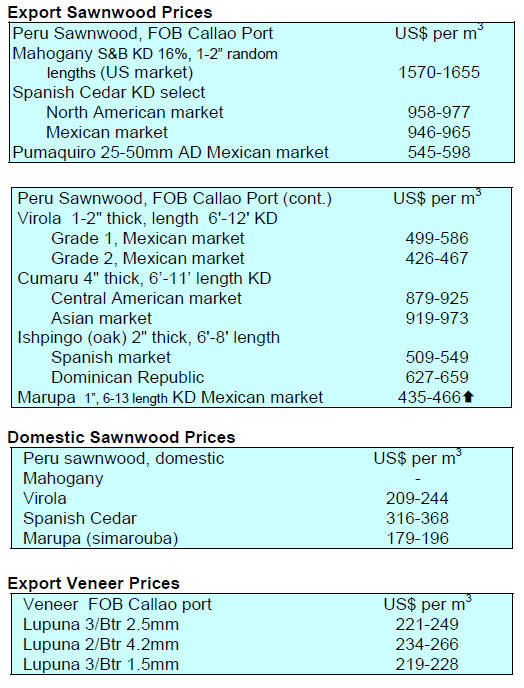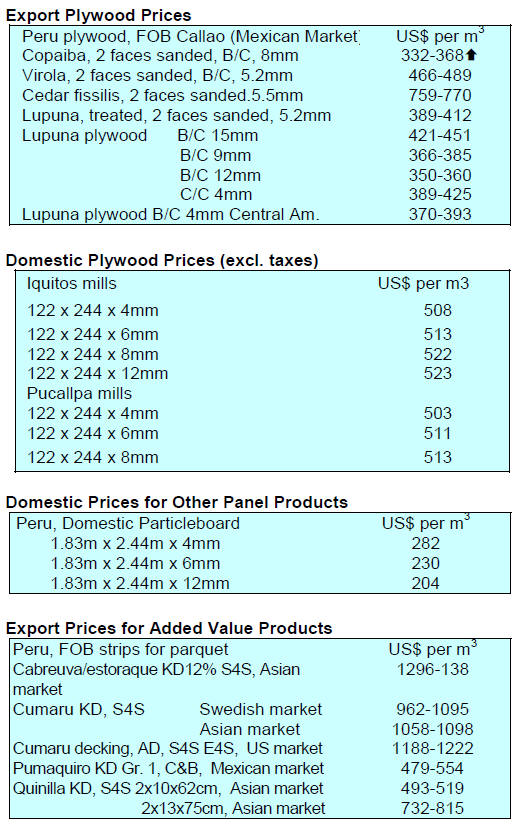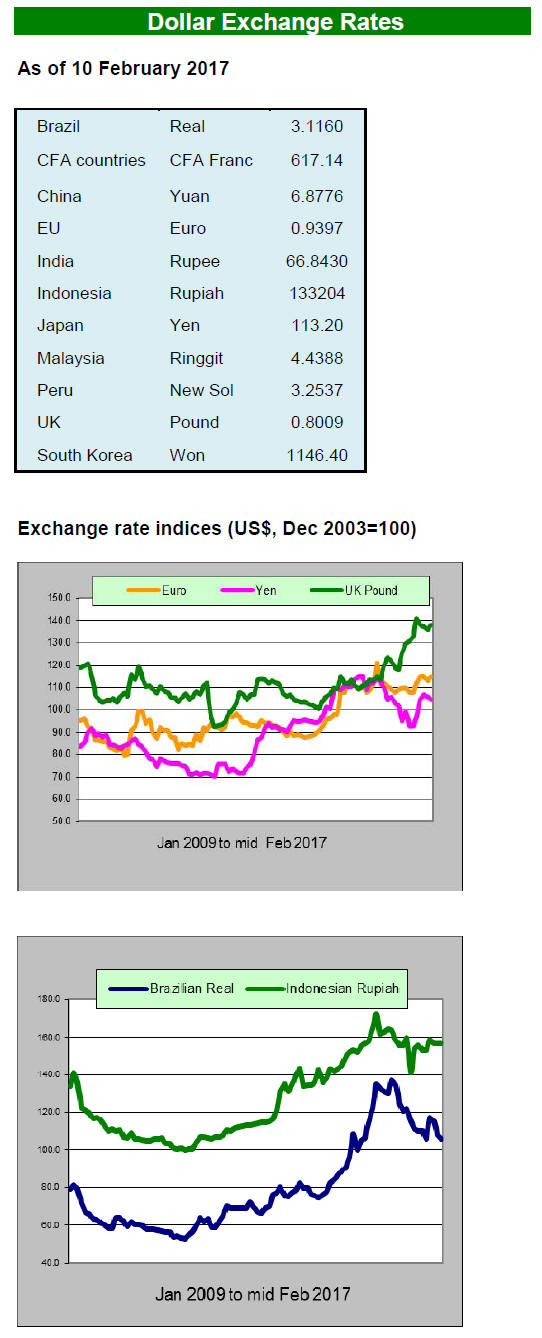2. GHANA
Business confidence high but much needs to
be
addressed
The Association of Ghana Industries (AGI) 2016 fourth
quarter Business Barometer report has revealed that
business confidence is hih amongst manufacturers.
The improvement in business confidence was lifted by
reaction to the initiative of the new government to create a
Ministry of Business Development and the promise to
remove what it termed ‘nuisance taxes’ to create an
environment conducive for businesses to thrive.
At a recent workshop the AGI identified four main areas
that need to be addressed if the business community is to
contribute more to Ghana’s economic recovery:
 The AGI is
calling for efficiency in power
The AGI is
calling for efficiency in power
generation, transmission and distribution to drive
down the high electricity tariffs.
 The multiplicity of taxes remains a
major
The multiplicity of taxes remains a
major
challenge facing businesses, significantly adding
up to the cost of doing business in the country
and thereby making Ghanaian businesses
uncompetitive.
 The National Council recognizes the
critical role
The National Council recognizes the
critical role
of export development in shoring up the cedi,
improve the country’s balance of trade, as well as
changing the structure of the economy.
 The AGI Council emphasised the need to
The AGI Council emphasised the need to
empower local businesses through Government
procurement and local content arrangements in all
strategic sectors of the economy.
The workshop considered promise of a new era for
industrialisation and how the AGI should position itself
strategically to ensure effective collaboration with the new
Government.
For more see:
http://agighana.org/uploaded_files/document/a6be2e9080f27447
2e717eca6f990bc2.pdf
The Minister designate for Business Development, Mr.
Ibrahim Mohammed Awal, pledged to make Ghanaian
businesses competitive in the global market.
Trade not aid - theme of new government
Ghana’s Vice President, Dr. Mahamudu Bawumia,
speaking at the 5th World Government Summit said the
government wants a relationship with the international
community driven by trade rather than aid.
According to Dr. Bawumia this would help diversify
Ghana’s economy and would spur growth. He further
noted that the best way to achieve growth is to provide a
solid business friendly foundation for domestic
investment.
See more at: http://citifmonline.com/2017/02/12/ghana-needsmore-
trade-not-foreign-aid-bawumia/#sthash.5KY8whyB.dpuf
Tema Port upgrade begins
Work has started to upgrade Tema Port and when
completed in 2019 it will be one of the largest container
ports on the African West Coast. Hellenic Shipping News
writes ‘the terminal will be operated by Meridian Port
Services (MPS), which is mainly owned by two privates
sector companies, Bolloré Transport and Logistics and
APM Terminals, plus Ghana Ports and Harbours
Authority. It is estimated that the terminal will create
5,000 new jobs.
For more see:
http://www.hellenicshippingnews.com/ghana-tema-port-projectcreates-
5000-jobs/
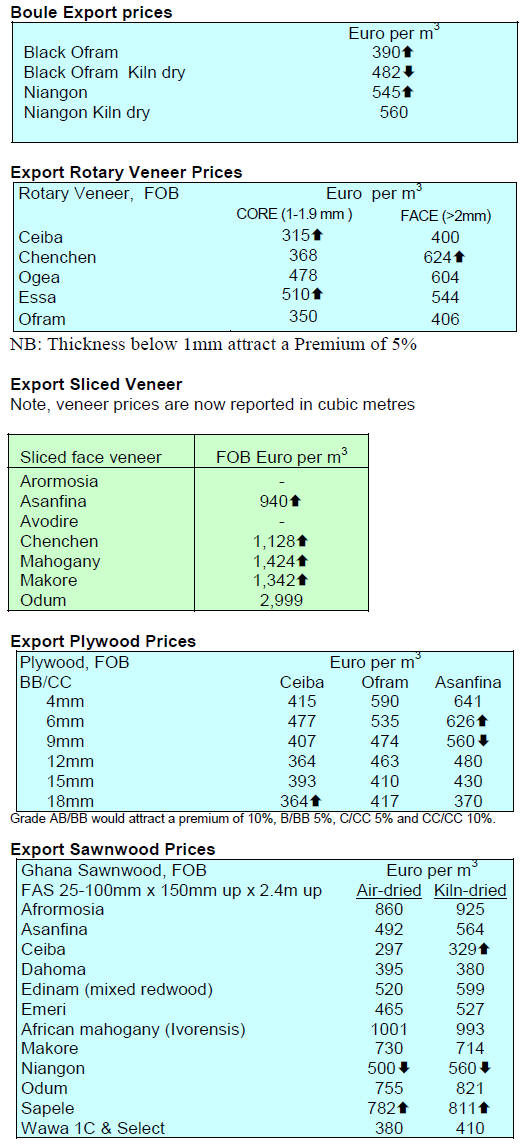
3.
SOUTH AFRICA
Shop-fitting and home renovations the
growth areas
The timber sector got off to a slow start in January
especially as a number of factories and mills only began
production on the 23rd of the month after the December
break.
The delay in starting production was mainly because,
under the union agreements, workers are entitled to 3-4
weeks holiday at year-end and some mills extended
production late into December thus delaying the start of
the holidays.
Despite the slow start, February saw the board
market
performing reasonably well and domestic producers were
able to secure their annual price increases.
The shop fitting sector continues to be busy and sales of
wood products to this sector are firming and there are
some signs of activity in the housing sector and it is the
renovation segment that is most buoyant at the moment.
There is less business to be found in the truss market as
the new-build market remains weak.
Prices for imported hardwoods under pressure
With respect to imports, African timbers are beginning to
arrive after year-end holidays and demand in this market is
steady. Demand for American hardwoods continues to be
firm but there is resistance to the higher white oak prices.
Despite Malaysian exporters lowering prices local analysts
say the market for meranti is weak at present.
Market to get a boost when new construction contracts
awarded
There are signals that stocks of domestically milled pine
are building up at the mills and the planned price increase
for pine sawnwood has been postponed until April at the
earliest.
Overall, traders are still waiting for the awarding of
construction contracts by both the government and private
secto,r many of which have been put on hold since the
August elections. Once these contracts are awarded
demand should improve but companies still complain
there are still a lot of problems with very slow payments
for government contracts.
Price indices
The difference in the price indices for meranti and okoume
is widening as buyers have been enticed back to meranti
by attractive bulk shipment prices. Only small quantities
of okoume are now imported and as such prices have not
fallen by much. The effect of bulk purchases of meranti
against spot purchases of small quantities of okoume is
exaggerating the price difference between the two timbers.
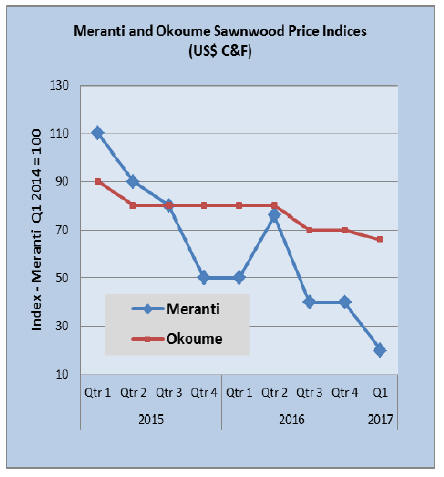
4.
MALAYSIA
Regional Comprehensive Economic
Partnership an
alternative to TPP
Despite the inevitable collapse of the Trans-Pacific
Partnership agreement (TPP) as the US has withdrawn
Malaysia has other trade options particularly the Regional
Comprehensive Economic Partnership (RCEP).
Deputy Minister of International Trade and Industry
Ahmad Maslan was quoted as saying that the RCEP will
be an attractive alternative for Malaysia as it is a huge
trading block which includes China and India.
ASEAN member countries especially Singapore,
Malaysia, Vietnam are also now expected to embrace the
Chinese-led ‘One Belt One road’ initiative as a good
alternative to the TPP.
Malaysia’s 2,000 furniture manufacturers
Malaysian furniture manufacturers have come a long way
from the time when the focus was on the domestic market.
Malaysia is now a major force in the international
furniture sector.
Last year, Malaysia’s furniture exports for the year to
November were valued at about RM8.6 billion with
products produced by over 2,000 furniture manufacturers.
The top export destinations were the US, Singapore,
Japan, Australia, the UK and India.
Particleboard prices set to rise in local market – floods
disrupt production in Thailand
Particleboard manufacturers in Malaysia stand to benefit
from higher prices in the coming months according to
industry analysts. The consensus is that particleboard
prices could rise by as much as 10%, due mainly to the
disruption to production in Thailand following recent
floods.
Demand for particleboard is also seen increasing with
many Malaysian furniture exporters enjoying better sales
on the back of the stronger US dollar.
Ramin, gaharu and rubberwood export quotas
The Malaysian Timber Export Board (MTIB) has
announced the 2017 quota for ramin and gaharu two
timbers to which CITES regulations apply.
The export quota for ramin products (including parts) is
fixed at 10,000 cu m while for karas/gaharu (Aquilaria
spp.) products, which includes wood chips, wood blocks
and essential oils the 2017 export quota is 150,000 kg.
In related news, the MTIB has set the export quota for
sawn rubberwood at 100,000 cu.m.
See:
http://www.mtib.gov.my/index.php?option=com_content&view=
article&id=2369%3Aexport-quota-for-2017-ramin-akarasgaharuproducts&
catid=1%3Ahighlights&Itemid=1&lang=en
Plywood export prices (end January 2017)
Plywood traders in Sarawak reported FOB export prices:
Floor base FB (11.5mm) US$540/cu.m
Concrete formboard panels CP (3’ x 6’) US$430/cu.m
Coated formboard panels UCP (3’ x 6’) US$500/cu.m
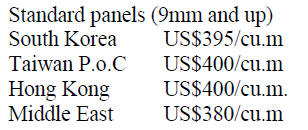
5. INDONESIA
Timber export growth target raised
The Director of Processing and Marketing of Forest
Products at the Ministry of Environment and Forestry has
said the government has negotiated trade deals to boost
export opportunities. The Director said the conclusion of
the VPA with the EU and the ready access of Indonesian
wood products into the EU member states will result in an
improved export performance.
It was stated that, as of January 2017, there were 3,600
companies that have satisfied the domestic timber legality
verification scheme (SVLK) and can export FLEGT wood
products.
See: http://industri.bisnis.com/read/20170126/12/623257/eksporkomoditas-
kayu-ditargetkan-tumbuh-10
Furniture businesses relieved that TPP is doomed
The decision of the US to withdraw from the Trans-Pacific
Partnership (TPP) has been welcomed by furniture
exporters in Indonesia. If the TPP went into effect without
Indonesia (Indonesia decided not to participate in
negotiations) then furniture makers in countries which
were signatories to the TPP would have a trading
advantage.
The Chairman of the East Java Association of Indonesian
Furniture and Handicraft Industries said that without the
TPP Indonesia can compete on a level playing field with
neighbouring countries when it comes to exports to the US
and other developed markets.
In related news, at the launch of a new IKEA shopping
center in Tangerang, Banten a spokesperson from IKEA
revealed that Indonesian products account for around 8%
of IKEA’s sales through 389 stores in 48 countries.
NGO - SVLK should not be allowed to crush
competitiveness
Fitrian Ardiansyah, Country Director at the Sustainable
Trade Initiative, has expressed concern that the domestic
SVLK and the requirements of the VPA may undermine
the competitiveness of small enterprises.
Many observers are urging the government work out how
best to support small companies that struggle to both
understand the requirements and pay for certification.
Indonesia-EU negotiations of CEPA
In late January Indonesia and the EU launched a second
meeting to discuss details of the planned Comprehensive
Economic Partnership Agreement (CEPA). One core
issues is that of market access.
Iman Pambagyo, Indonesia’s International Trade
Negotiation Director General at the Ministry of Trade said
the current round focused on intellectual property rights,
competition, transparency policy, dispute settlement, trade
and sustainable development.
The Indonesia/EU CEPA discussions have been ongoing
since 2010 with little progress however negotiators on
both sides are aiming for a 2018 completion of the deal.
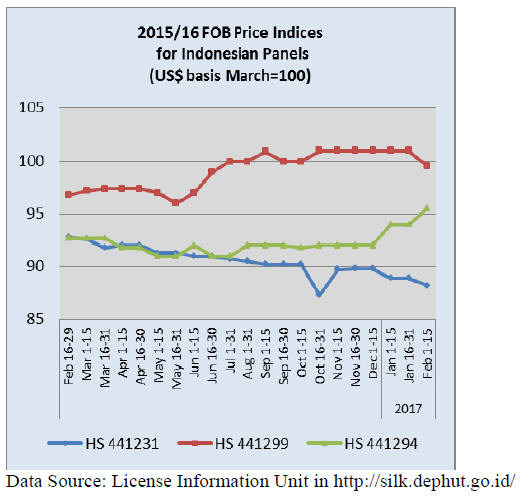
6. MYANMAR
Another loop-hole to close
The Sagaing Regional Minister for Agriculture, Livestock
and Irrigation has raised concerns on the vast area of land
grated for farming. He claims evidence that many of those
granted farming rights were using farming as a pretext for
harvesting logs from the area.
Analysts in Myanmar point out that a previous ‘vacant
land management’ law allowed clearing of land intended
for farming but the minister is asserting that most
companies have done only a perfunctory job of farming
the land. To address this minister is proposing that the land
be repossessed.
Under the previous government in Myanmar more than
300 individuals and organisations were granted 30 year
farming rights over almost 240,000 ha. across the country.
Smugglers adapting to avoid overland route
Following the discovery in January of the attempted
smuggling of containers of teak through Yangon Port the
authorities have stepped up surveillance and recently
discovered a further 1,000 tons of illegal padauk
and tamalan in containers in the outskirts of Yangon.
The Deputy Director General of the Forestry Department
commented that smugglers were attempting to use a new
route for illegal exports. Previously, smuggled timber
crossed the border with China but since the crackdown on
the border and strict controls in China smugglers have
switched to ocean transport out of Yangon Port.
Analysts were quick to point out that a container of timber
can only be transported and enter the port with required
documentation from the Forestry Department and they ask
how such quantity can escape the check points along the
route to the port.
The value of the seized timber is estimated around 2.6
billion Kyats (about US$2 million) and the timber
specifications exceed that allowed for export.
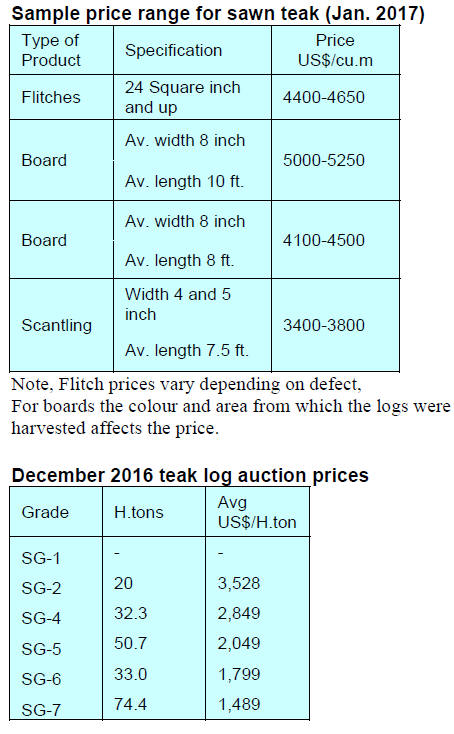
7. INDIA
Inflation rate trends
The Office of the Economic Adviser (OEA) to the Indian
government provides trends in the wholesale price index
(WPI). The official WPI for all commodities (Base: 2004-
05=100) for December 2016 declined by 0.2% to 182.8
from 183.1 for November.
The annual rate of inflation, based on the monthly WPI,
stood at 3.39% (provisional) for December 2016 compared
to 3.15% for November.
See:
http://eaindustry.nic.in/cmonthly.pdf
Timber and plywood price indices slide at year end
The OEA also reports wholesale price indices for a variety
of wood products. The WPI for wood products and
plywood are shown below.
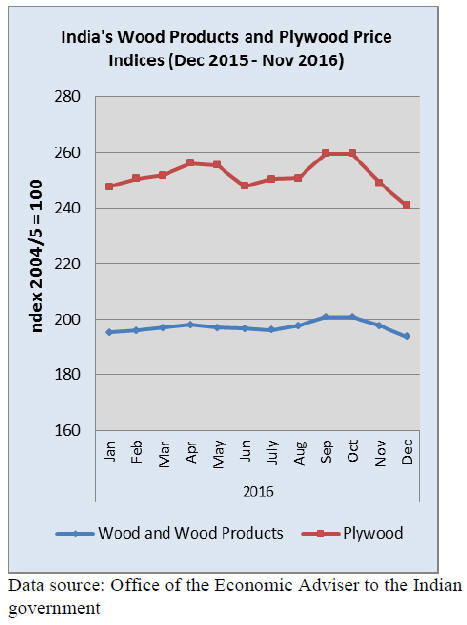
Andhra Pradesh auction of seized red sanders
A huge volume of seized red sanders logs were recently
auctioned attracting buyers from China, Japan, Malaysia,
Indonesia, UAE, Singapore and Thailand.
The Andhra Pradesh Forest Department offered almost
3,000 tonnes of red sanders in a sale that extended from
the end of December 2016 to the first week of January this
year.
China and Japan are the leading buyers attracted by the
quality of red sanders grown in southern Andhra Pradesh,
particularly Chittoor, Kadapa, Nellore, Kurnool and
Prakasam. Natural forest red sanders logs attract much
higher prices than logs from trees grown by farmers on the
lowlands.
Local analysts report that most of the logs were
sold with
prices ranging from US$18,000-60,000 per tonne.
Red sanders commands a very high price in international
markets and despite being protected in India illegal felling
and smuggling is common in Chittoor, Kadapa and
Nellore districts. Red sanders is a highly endangered tree
found only in the Seshachalam hill forests, a hilly range
part of the Eastern Ghats in southern Andhra Pradesh state
in southeastern India.
Recently, a police officer and several forest officers were
among a group captured by officers of a special task force
created to address illegal felling and smuggling. Media
reports say 29 red sanders logs weighing 1.30 tonnes were
seized from the group of smugglers in Kadapa.
http://www.thehindu.com/news/national/andhra-pradesh/Copfive-
forest-staff-among-11-held-for-red-sanderssmuggling/
article17113724.ece
Stock of unsold homes weighing on construction firms
Home sales in the major eight Indian cities fell sharply
towards the end of 2016 (-15%) as buyers held back on
purchases waiting to see what long term impact
demonetisation was going to have on interest rates and the
overall economy. A report from Liases and Foras Real
Estate Rating and Research says the worst fall was
recorded in Chennai, Pune and Bengaluru. It was only in
Kolkata that the researchers found a year on year rise.
The fall in sales is having a damaging impact on the
finances of construction companies which are stuck with a
huge stock of unsold properties and this has resulted in a
cut-back on new-build projects.
The Indian real estate sector has seen tough times over the
past few years. Interest rates were pushed up by the
Reserve Bank of India and rising construction cost were
passed on as higher sales prices, both of which dampened
demand. However, interest rates on home loans are
coming down gradually.
For more see: http://www.hindustantimes.com/mumbainews/
unsold-real-estate-units-touch-2-55-lakh-in-mumbaimetropolitan-
region/story-xnlU6dFOdTK2xfMXS3sZJN.html
Plantation teak prices
Demand for imported plantation logs and sawnwood is
steady and prices have not changed over the past two
weeks.
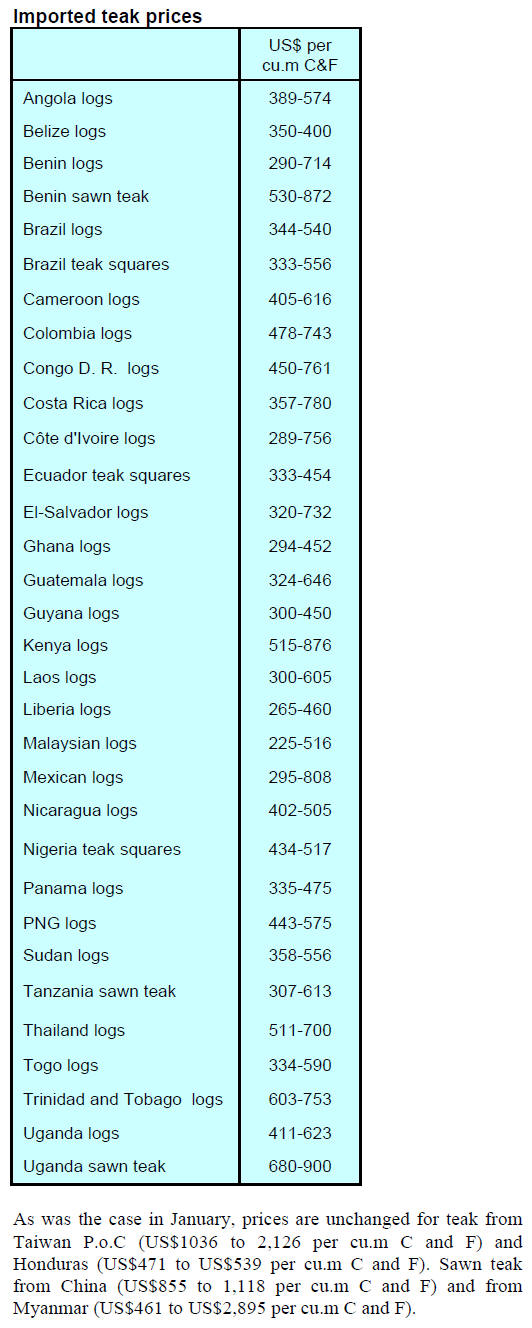
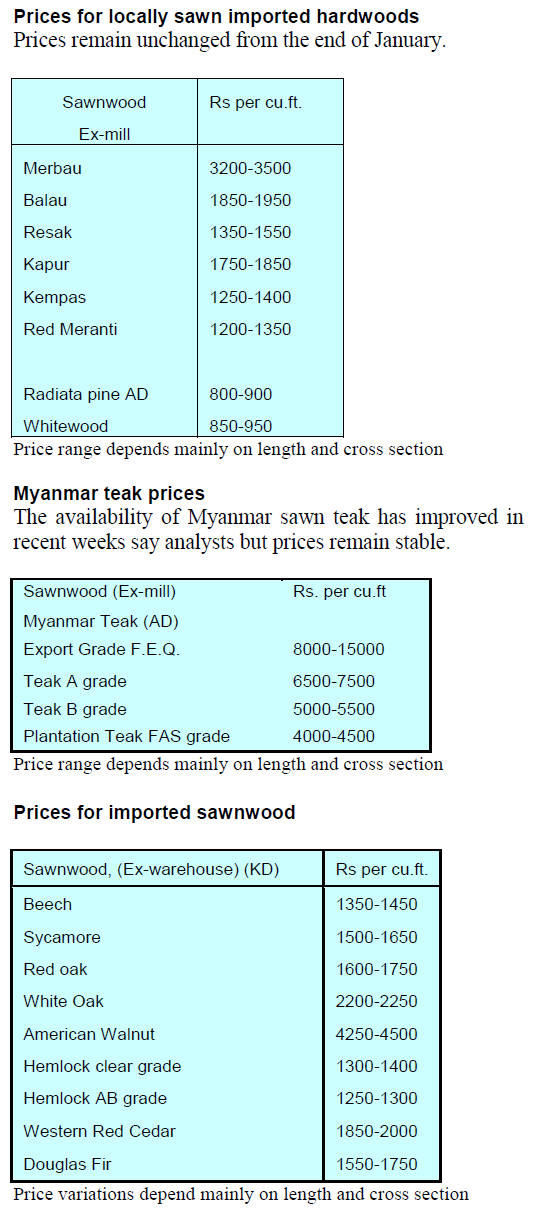
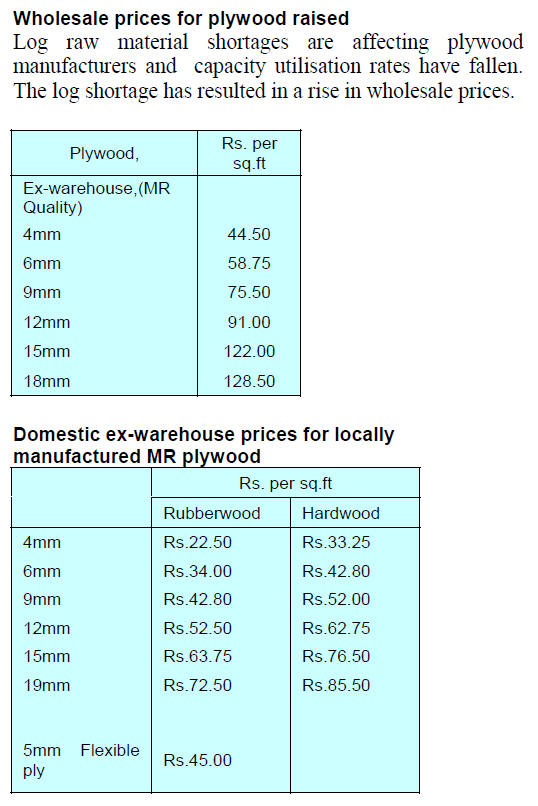
Indian furniture market to exceed US$27 billion
in five
years
A press release from TechSci Research, a company
specialising in research in high growth and emerging
markets, points to a likely surge in Indian demand for
furniture. The press release says housing growth and
changing lifestyles, coupled with rising design awareness,
will drive the India furniture market over the next five
years.
The market forecast from TechSci points to the recent shift
from traditional furniture towards contemporary furniture
as buyers in the country are becoming more brand
conscious and have greater disposable incomes. Moreover,
rapidly expanding distribution network by exclusive stores
is also expected to boost the country’s furniture market.
Karan Chechi, Research Director with TechSci Research
writes “Over the years, the travel and tourism sector has
been one of the major contributors to growing demand for
furniture in India. The number of foreign tourist in India
increased from 6.31 million in 2011 to 8.03 million by
2015. With increasing number of domestic as well as
foreign tourists, the same trend is expected to continue
over the next five years”
See: https://www.techsciresearch.com/news/2386-indiafurniture-
market-to-surpass-27-billion-by-2022.html
8. BRAZIL
Industry concerned over revised timber
transport
control system
In Brazil a Forest Products Trade and Transport System
(SISFLORA) is used to monitor and control the transport
of forest products. Recently, entrepreneurs and
representatives of employers' unions in the forestry sector
in Mato Grosso do Sul met with the State Secretary of the
Environment to raise their concerns on the updated version
of the system (SISFLORA 2.0).
SISFLORA 2.0 adopts a new system for the chain of
custody reporting and will be applied by state
environmental agencies.
Concerns have been raised that the new system involves
an extremely detailed control mechanism conducted in
real-time using an online system. Data at each stage of the
process, including those carried out in the field, has to be
logged into the system.
In addition, the authorisation process for issuing the
document ‘Forest Guide’ (Guia Florestal - GF) which is
required during the purchase, sale and transport of logs
and primary wood products has become more
bureaucratic.
One of the problems identified by producers is that the
new system will demand access to high-speed internet
services and will require that a technician needs to be
permanently logged into the system to carry out data
insertion. Another obstacle is that increasing the
complexity of the system will also require more skilled
manpower and this will generate new cost centres for
entrepreneurs.
In addition, the new system creates legal uncertainty for
producers where a simple error of data recording due to
the complexity of the system could trigger penalties,
suspension of the company´s activity or even lawsuits for
environmental crimes.
According to timber producers the new system requires
too much detail and because this must be ‘real-time’,
satisfying the new requirement will be an enormous
challenge.
Bento Gonçalves furniture cluster suffers job losses
The Bento Gonçalves furniture industry ended 2016 with
6,441 direct jobs which represented a loss of 753 jobs
compared to 2015 and is the lowest employment has been
in the sector for almost 10 years.
Since the beginning of 2014 furniture manufacturers in
Bento Gonçalves have shed more than 2,500 direct jobs.
For Brazil as a whole employmet in the sector in 2016
was 241,890 direct jobs (down 17,688 year on year). In the
Rio Grande do Sul state, the 2016 balance was 36,089
(down 2,689) direct jobs.
The Bento Gonçalves Furniture Industry Union
(Sindmóveis) points out that this is an unprecedented
economic and financial crisis affecting all levels of
industry. The furniture sector appears to be one of the
sectors most impacted by the economic crisis in the
country. However, in 2017, the pace of decline in
economic activity is expected to slow and by the second
half of the year a recovery should begin.
Currently, the Bento Gonçalves furniture cluster accounts
for 31% of the furniture industry in the State of Rio
Grande do Sul and generates 45% of the industry's
revenues of the Bento Gonçalves municipality. There are
approximately 300 enterprises in the Bento Gonçalves
furniture cluster.
Forestry sector registers trade surplus
The Brazilian forest plantation sector registered a growth
in export volumes in 2016 recording exports of 12.9
million tonnes of pulp (+ 12%), 2.1 million tonnes of
paper and 1 million cu.m (+ 64%) of woodbased panels.
2016 exports were worth US$7.6 billion (-1.6%); pulp
accounted for US$5.5 billion (-0.5%), paper US$ 1.8
billion (-7.4%) and woodbased panels US$250 million
(+28.2%). The trade balance in 2016 was US$ 6.6 billion.
The Chinese market was the main destination for pulp
exports (38.9% worth US$ 2.1 billion), followed by
Europe with 33.1% (US$ 1.8 billion). Latin America was
the main export market for timber and paper segments,
exports of which to regional markets represented 60.6% of
the total and were worth US$1.1 billion and 54.4% (US$
136 million), respectively.
Brazilian pulp production reached 18.7 million tonnes
(+8.1%) last year and paper production remained stable at
10.3 million tonnes. Paper sales in the domestic market
exceeded 5.4 million tonnes (-0.3%) in 2016 while
domestic sales of woodbased panels were 6.2 million cu.m
(-2.1% year on year).
ABIMCI seeks GSP for Brazilian wood products
The Office of the United States Trade Representative
(USTR) in its annual review of the Generalized System of
Preferences (GSP) agreed to consider the petition
submitted by the Brazilian Association of Mechanically-
Processed Timber Industry (ABIMCI). ABIMCI requested
Competitive Need Limitation (CNL) waivers in favour of
the Brazilian exports of coniferous wood continuously
shaped along any of its ends (HTS 4409.10.05). The
petition was filed by the Association in December 2016.
The next step for ABIMCI is to comply with the deadlines
for submissions. ABIMCI must provide comments and
request for participation in public hearings regarding the
petition.
The United States is the main destination of most Brazilian
wood products so the US decisions on GSP are relevant to
Brazil.
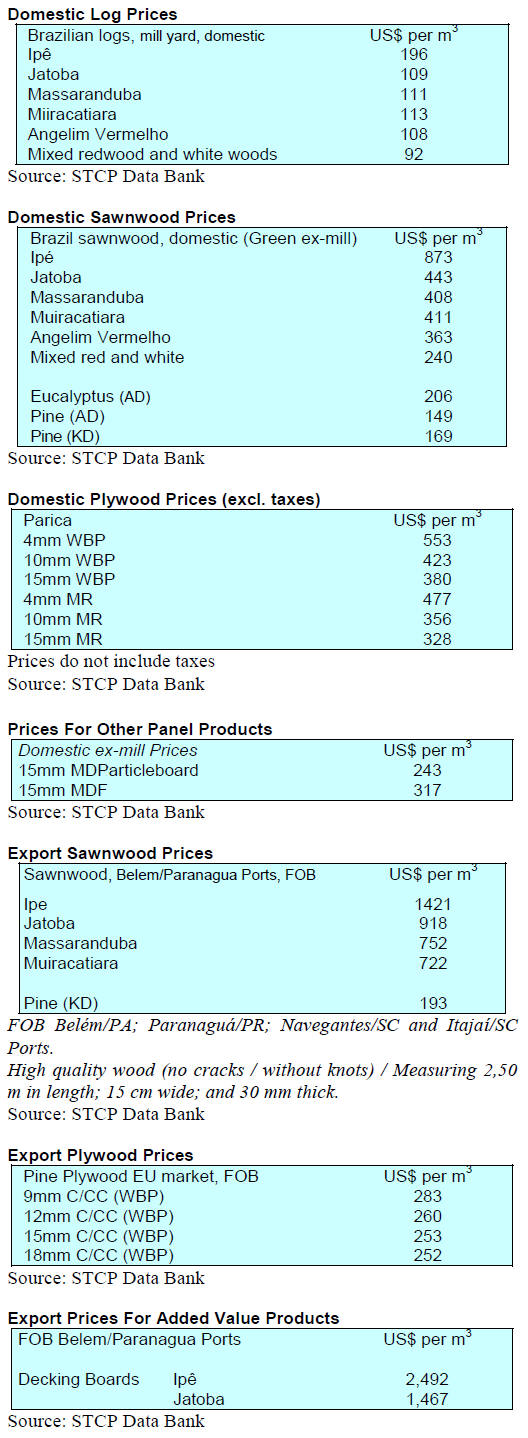
9.
PERU
Tableros Peruanos S.A. (Tapesa), Peru's only
particleboard
manufacturer has folded. The company, founded in 1973
produced raw and coated boards under the Maderba brand.
The Tapesa plant had an annual production capacity of
60,000 cubic metres and utilised pine, eucalyptus and
bagasse. Sadly the domestic plant could not compete with
imports from Ecuador and Chile and more recently from
Spain.
ADEX: too many inoperative forest concession
Erik Fischer, chairman of the Committee on Wood and
Wood Industry in the Association of Exporters (ADEX)
has continued the debate on concession allocation.
His assertion is that while the revised law (Legislative
Decree No. 1283) simplifies administrative procedures and
is of benefit to development of forestry in the country now
is the time to review the concession allocation processes to
ensure viable and responsible companies are encouraged
to invest.
He repeated once again the view that of the millions of
hectares that have been allocated as concessions only
around a quarter are operational and contributing nothing
to the national economy.
In order to address this unfortunate situation Fischer said it
is necessary to strengthen the capacity of regional forestry
authorities through budgetary support and technical
training by the central government.
